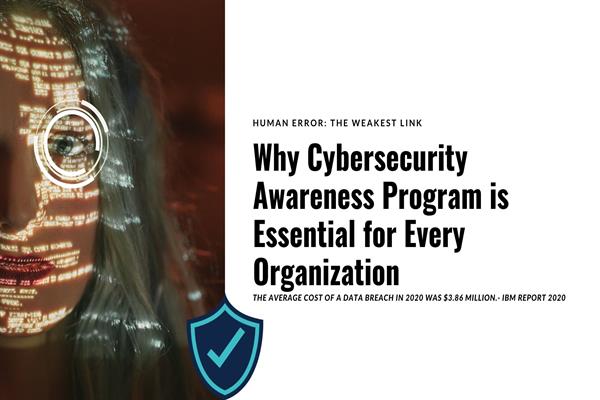Why a Cybersecurity Awareness Program is Essential for Every Organization
In today's interconnected world, where digital technologies have become an integral part of business operations, organizations are facing a growing number of cyber threats. The constant evolution of these threats necessitates a proactive approach to cybersecurity. While organizations invest significant resources in implementing advanced security measures and technologies, they often neglect one crucial aspect: human behavior. Employees are a critical link in the cybersecurity chain, and their lack of awareness and understanding of cybersecurity best practices can expose organizations to significant risks. This is where a comprehensive cybersecurity awareness program plays a vital role. In this article, we will explore why a cybersecurity awareness program is required for any organization.
Human Error: The Weakest Link
Despite advances in technology, human error remains the weakest link in an organization's cybersecurity defense. Cybercriminals exploit vulnerabilities in human behavior through various tactics such as phishing, social engineering, and insider threats. Without proper awareness and training, employees may unknowingly fall victim to these attacks, compromising the organization's security posture. A robust cybersecurity awareness program educates employees about common threats, teaches them to recognize suspicious activities, and provides guidelines for safe online practices.
Strengthening the Security Culture
Implementing a cybersecurity awareness program fosters a security-conscious culture within the organization. When employees are educated about cybersecurity risks and their role in protecting sensitive information, they become active participants in safeguarding the organization's assets. By creating a shared responsibility for cybersecurity, employees are more likely to follow security policies, report suspicious incidents, and adopt secure behaviors. This collective effort significantly enhances an organization's overall security posture.
Mitigating Financial Losses
Cybersecurity breaches can result in significant financial losses for organizations. Data breaches, ransomware attacks, and intellectual property theft can lead to direct financial losses, regulatory penalties, legal liabilities, and damage to an organization's reputation. According to a report by IBM, the average cost of a data breach in 2020 was $3.86 million. A cybersecurity awareness program equips employees with the knowledge and skills to detect and respond appropriately to potential threats, minimizing the likelihood and impact of cyber incidents.
Regulatory Compliance
Organizations across various industries are subject to regulatory frameworks that require them to implement adequate security measures to protect sensitive data. Non-compliance with these regulations can result in severe consequences, including hefty fines and legal actions. A cybersecurity awareness program ensures that employees are aware of their responsibilities in adhering to industry-specific regulations such as the General Data Protection Regulation (GDPR) or the Health Insurance Portability and Accountability Act (HIPAA). By educating employees about these regulations and the potential consequences of non-compliance, organizations can establish a culture of compliance and reduce the risk of regulatory penalties.
Protecting Intellectual Property
Intellectual property (IP) is often one of an organization's most valuable assets. However, it is also one of the most sought-after targets for cybercriminals. Insider threats, industrial espionage, and unauthorized access pose significant risks to the confidentiality and integrity of an organization's IP. A cybersecurity awareness program raises employee awareness about the importance of safeguarding intellectual property, teaches them about the risks associated with data breaches, and provides guidelines for secure handling and storage of sensitive information.
Safeguarding Customer Trust
Maintaining customer trust is essential for any organization's success. A single cybersecurity incident can erode trust and lead to customer attrition. By implementing a robust cybersecurity awareness program, organizations can demonstrate their commitment to protecting customer data and sensitive information. Educating employees about the importance of data privacy, secure communication channels, and responsible data handling practices helps build customer trust and loyalty. A strong cybersecurity posture becomes a competitive advantage, differentiating the organization from its peers.
Incident Response and Reporting
In the event of a cybersecurity incident, an organization's ability to respond promptly and effectively is crucial in mitigating the damage. A cybersecurity awareness program trains employees on incident response protocols, including the steps to take when they suspect a security breach. Prompt reporting of potential incidents allows the organization's cybersecurity team to take immediate action, minimizing the impact and preventing further damage. Employee awareness and a well-defined incident response plan go hand in hand in ensuring a swift and efficient response to cyber threats.
Evolving Threat Landscape
The threat landscape is constantly evolving, with cybercriminals developing new techniques and exploiting emerging vulnerabilities. Organizations must stay ahead of these threats by continuously updating their security measures and practices. A cybersecurity awareness program serves as an ongoing process to keep employees informed about the latest threats, attack vectors, and best practices for prevention and detection. Regular training sessions, simulated phishing exercises, and knowledge sharing forums ensure that employees remain up-to-date with the changing cybersecurity landscape.
Remote Work and Bring Your Own Device (BYOD)
The global pandemic has accelerated the adoption of remote work and the use of personal devices for business purposes. While these practices offer flexibility and productivity benefits, they also introduce additional cybersecurity risks. Employees working remotely may not have the same level of security controls as they would in an office environment. A cybersecurity awareness program addresses these risks by educating employees about secure remote work practices, the importance of strong passwords, secure Wi-Fi connections, and the risks associated with using personal devices for work purposes.
Conclusion
In today's digital age, organizations cannot afford to overlook the human element in cybersecurity. A cybersecurity awareness program is a crucial investment for any organization, as it empowers employees with the knowledge and skills necessary to protect sensitive information, detect threats, and respond effectively to cyber incidents. By creating a security-conscious culture, organizations can strengthen their defense against cyber threats, minimize financial losses, comply with regulatory requirements, safeguard intellectual property, and maintain customer trust. In an ever-evolving threat landscape, a comprehensive cybersecurity awareness program is an essential component of a holistic cybersecurity strategy for organizations of all sizes and industries.





